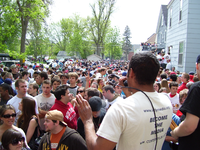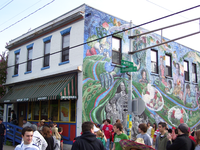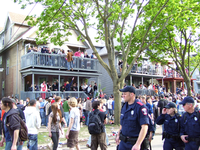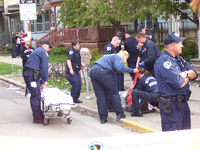
Mifflin Street Block Party
Encyclopedia

Madison, Wisconsin
Madison is the capital of the U.S. state of Wisconsin and the county seat of Dane County. It is also home to the University of Wisconsin–Madison....
, Wisconsin
Wisconsin
Wisconsin is a U.S. state located in the north-central United States and is part of the Midwest. It is bordered by Minnesota to the west, Iowa to the southwest, Illinois to the south, Lake Michigan to the east, Michigan to the northeast, and Lake Superior to the north. Wisconsin's capital is...
on the first Saturday of May. The 2011 Mifflin Block Party is scheduled for April 30th. It is one of two large parties held in Madison, the other being the Halloween party
State Street Halloween Party
The State Street Halloween Party is an annual Halloween party in Madison, Wisconsin.State Street has gained recognition as a gathering place for tens of thousands of party-goers from several states on Halloween...
on State Street
State Street (Madison)
State Street is a pedestrian mall located in downtown Madison, Wisconsin, United States, near the Wisconsin State Capitol. The road proper extends from the west corner of land comprising the Capitol westward to Lake Street, adjoining the campus of the University of Wisconsin - Madison at Library...
. In 2005, the block party attracted around 20,000 participants. The party features widespread consumption of alcoholic beverage
Alcoholic beverage
An alcoholic beverage is a drink containing ethanol, commonly known as alcohol. Alcoholic beverages are divided into three general classes: beers, wines, and spirits. They are legally consumed in most countries, and over 100 countries have laws regulating their production, sale, and consumption...
s, as well as local and out-of-state musical acts playing on house porch
Porch
A porch is external to the walls of the main building proper, but may be enclosed by screen, latticework, broad windows, or other light frame walls extending from the main structure.There are various styles of porches, all of which depend on the architectural tradition of its location...
es, balconies
Balcony
Balcony , a platform projecting from the wall of a building, supported by columns or console brackets, and enclosed with a balustrade.-Types:The traditional Maltese balcony is a wooden closed balcony projecting from a...
and backyard stages.
History



Opposition to the Vietnam War
The movement against US involvment in the in Vietnam War began in the United States with demonstrations in 1964 and grew in strength in later years. The US became polarized between those who advocated continued involvement in Vietnam, and those who wanted peace. Peace movements consisted largely of...
against the Vietnam War
Vietnam War
The Vietnam War was a Cold War-era military conflict that occurred in Vietnam, Laos, and Cambodia from 1 November 1955 to the fall of Saigon on 30 April 1975. This war followed the First Indochina War and was fought between North Vietnam, supported by its communist allies, and the government of...
. Its original date, May 3, was set to coincide with the one year anniversary of the French student rebellion. Anti-war sentiments had accelerated in Madison since the 1967 Dow Chemical protest in which thousands of students occupied, and were violently expelled from, Ingraham Hall. The original event arose as part of a continuing conflict between students and police in the "Miffland" area, centered on Mifflin Street. Police refused to allow permission for the street dance and when they entered the area in response to a noise complaint, a confrontation ensued that lasted three nights and spread into the surrounding student areas. Students threw stones at the police and constructed barricades to defend themselves. The police responded with tear gas and billy clubs. At the end, 70 people were injured and more than 100 arrested, including future and current mayor, Paul Soglin
Paul Soglin
Paul Soglin is the mayor of Madison, Wisconsin.-Early life and education:Soglin was raised in the Hyde Park neighborhood of Chicago...
.
The event continued annually for the duration of the war, even though the traumatic effects of the nearby Sterling Hall bombing
Sterling Hall bombing
The Sterling Hall Bombing that occurred on the University of Wisconsin–Madison campus on August 24, 1970 was committed by four young people as a protest against the University's research connections with the US military during the Vietnam War...
had a dampening effect on Madison anti-war efforts. In an attempt to control the event, the city created "Mifflin on the Mall" in 1979 with music and concessions on State Street Mall. By 1982, however, students had once again taken to Mifflin Street. Under sponsorship from the Mifflin Co-Op, the block party was often used as a community fundraiser for various political or social causes. The co-op dropped its greater involvement in 1991 after the city requested that organizers keep alcohol within fenced-in beer gardens.
By 1990, police had decided to not have any officers patrol the event and removed any official presence from the party. Despite crowds in excess of 10,000 no major problems occurred until a riot in 1996. Following this event, the city and police took more control in planning. They now effectively dictate the terms of the party, spending in excess of $80,000 on policing.
In 2011 the city agreed to allow open alcoholic beverages in the street for individuals of legal drinking age if they have a wristband. In previous years the police had noted that their most difficult areas to control were backyards, so this change in rules is an attempt to draw people into the streets and allow greater contol by police officers. Also new to the event in 2011, The Majestic Theater, a local music venue, oficially sponsored and hosted the event attempting to a put greater emphasis on music. Although full details are yet to be released, MPD officers reported the crowd size, and the number of very intoxicated people was far greater in 2011 than recent Mifflin Street Block Parties due to the change in open intoxicants rules. Preliminary numbers released showed 160 people were arrested, two people were stabbed, and multiple police officers were injured during the 2011 event.
1996 riot
On May 6, 1996, a riotRiot
A riot is a form of civil disorder characterized often by what is thought of as disorganized groups lashing out in a sudden and intense rash of violence against authority, property or people. While individuals may attempt to lead or control a riot, riots are thought to be typically chaotic and...
broke out, when a crowd of several thousand people threw bottles at a fire truck that had come to put out a bonfire
Bonfire
A bonfire is a controlled outdoor fire used for informal disposal of burnable waste material or as part of a celebration. Celebratory bonfires are typically designed to burn quickly and may be very large...
started by the crowd to combat the cold weather. Police used riot gear
Riot control
Riot control refers to the measures used by police, military, or other security forces to control, disperse, and arrest civilians who are involved in a riot, demonstration, or protest. Law enforcement officers or soldiers have long used non-lethal weapons such as batons and whips to disperse crowds...
to retake the block. The riots resulted in thousands of dollars of damage. The 1997 event was planned very carefully, but attracted few people due to poor weather. No major riots have occurred since 1996.
Date change
The block party occurred on the first Saturday of May every year until 2005, when University of Wisconsin–MadisonUniversity of Wisconsin–Madison
The University of Wisconsin–Madison is a public research university located in Madison, Wisconsin, United States. Founded in 1848, UW–Madison is the flagship campus of the University of Wisconsin System. It became a land-grant institution in 1866...
students lobbied to have the date changed to the last Saturday in April to avoid conflicts with finals
Final examination
A final examination is a test given to students at the end of a course of study or training. Although the term can be used in the context of physical training, it most often occurs in the academic world...
. Mayor Dave Cieslewicz
Dave Cieslewicz
David J. Cieslewicz ; born February 17, 1959) is an American politician who served as mayor of Madison, Wisconsin from 2003 to 2011. He is a member of the Democratic Party.-Personal life and early career:...
refused the date change at first, citing the additional cost and strain it would place on the city's police
Police
The police is a personification of the state designated to put in practice the enforced law, protect property and reduce civil disorder in civilian matters. Their powers include the legitimized use of force...
force. After students vowed to throw a large celebration both weekends, the mayor agreed to move the date of the block party with a promise from student leaders that they would discourage celebrations on the first week in May. However, the mayor requested that the Associated Students of Madison pay for the additional costs of moving the date. The 2005 event was considered one of the calmest on record, with 225 arrests and 317 citations, including the arrest of the University of Wisconsin football team
Wisconsin Badgers football
The Wisconsin Badgers are a college football program that represents the University of Wisconsin–Madison in the NCAA Football Bowl Subdivision and the Big Ten Conference. They play their home games at Camp Randall Stadium, the fourth-oldest stadium in college football...
's running back
Running back
A running back is a gridiron football position, who is typically lined up in the offensive backfield. The primary roles of a running back are to receive handoffs from the quarterback for a rushing play, to catch passes from out of the backfield, and to block.There are usually one or two running...
, Booker Stanley. The block party was scheduled for Saturday, April 29 by city officials in 2006. The 2007 party marked a move back to the traditional first Saturday of May and the 2008 party was scheduled for Saturday, 3 May 2008. The 2009 block party occurred on May 2. The 2010 block party happened on May 1. Then the 2011 party on April 30th.
Police control
Between 1998 and 2002, attendance ranged from several hundred to a couple thousand. In 2002, however, an unexpected 20,000 people showed up for the event. That same year, a riot during Madison's Halloween festivitiesState Street Halloween Party
The State Street Halloween Party is an annual Halloween party in Madison, Wisconsin.State Street has gained recognition as a gathering place for tens of thousands of party-goers from several states on Halloween...
prompted police to begin systematically clamping down on the Mifflin event. The city has consistently refused proposals by students to close the street and revive the block party under student control. A Madison police lieutenant was quoted as saying, "Quite frankly, we wish this event would go away." Since 2002, there have been an increased number of arrests and a decrease in attendance. The majority of arrests are for alcohol-related incidents.
Police have dealt with the event by heavily enforcing a number of ordinances. This has included the banning of glass containers on Mifflin, the limiting of the number of kegs that a house party can have, and the creation of a processing center for dealing with those arrested. Police are also notorious for handing out open container citations and targeting especially loud and raucous house parties. In 2004, one house received $25,000 in fines for "selling alcohol without a permit." In 2005, police arrested 225 people and issued 317 citations. The cost to the city was $100,600 and they received $85,000 in fines.
Drinking


